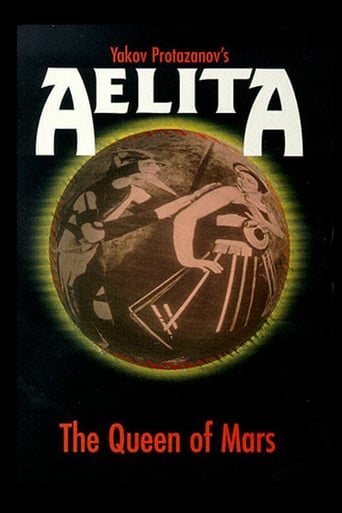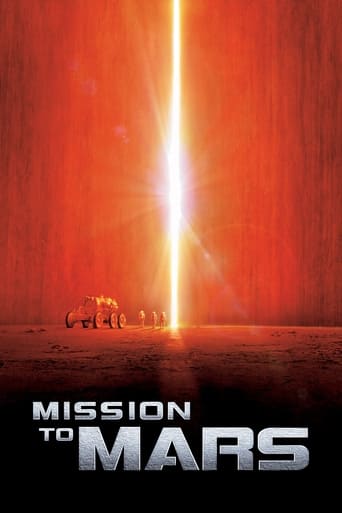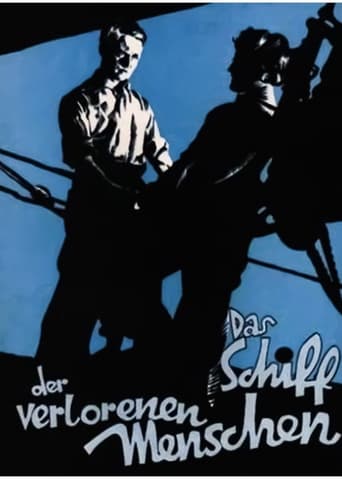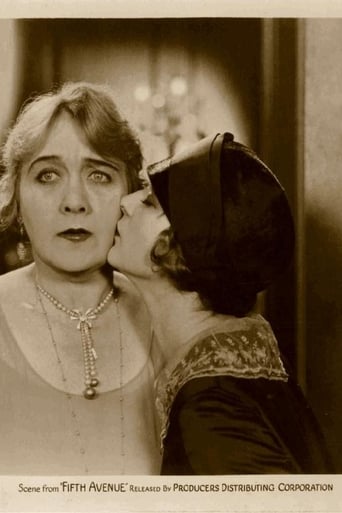


Aelita: Queen of Mars
A young man travels to Mars in a rocket ship, where he leads a popular uprising against the ruling group with the support of Queen Aelita, who has fallen in love with him after watching him through a telescope.
-
- Cast:
- Yuliya Solntseva , Igor Ilyinsky , Nikolai Batalov , Vera Orlova , Pavel Pol , Konstantin Eggert , Iosif Tolchanov


Similar titles








Reviews
Very very predictable, including the post credit scene !!!
One of my all time favorites.
Good movie, but best of all time? Hardly . . .
Absolutely Fantastic
I was always looking forward to seeing this, because I love classic science fiction in general, and I also enjoyed the original book by Aleksei Tolstoy. Unfortunately, they messed up his story in the worst way, removing all the vague criticism of the revolutionary urge, and actually turning the bulk of his book into a dream sequence.Most of the film has nothing to do with science fiction..... the entire first half is setting up 3 characters who have nothing to do with each other until we are well into the final half of the film. The direction is tedious, mostly in medium long shots. The "Queen of Mars", who in the book was supposed to be the most beautiful woman in the universe, looks like a teenage boy.At the worst possible point, the film devolves into Soviet propaganda, complete with burning letters for the date of their revolution 10/25/17 and a hammer and sickle. I guess the Soviet government thought that this film would be popular abroad because of the sci-fi and the effects, and that it would indoctrinate people in their revolutionary ideas. But there are basically no ideas here, except that the workers on Mars have to wear boxes on their heads and live underground. The effects are not very impressive compared to what Lang was doing at UFA.There are some interesting design elements in the costumes, but that's about it as far as any kind of retro sci-fi appeal. The story is painfully ludicrous.... we're expected to feel sympathy for the hero's girlfriend, because she just can't resist the pleasures of pre-revolutionary Russia (like chocolate and waltzing). At the end, the hero burns his plans for a spaceship, because "we have more important work to do here" (hello.... Sputnik?). I'm sure a lot of fellow travelers felt quite that way about Protazanov's bulky film.
Considered the first Russian science-fiction movie, Aelita can be viewed as a combination of dream and reality, an intricate portrayal of different worlds and different topics. The film I believe has some memorable scenes, which can be regarded as good cinema, and also the film nicely experiments with techniques like flash-back and dream-like states. On the other hand, the movie has its flaws and one can only wonder how this promising work could have been handled by merely simplifying the overly-complex plot.Loss, a Russian engineer who is obsessed by deciphering an intercepted radio message, portrays the typical scientist whose dream is to conquer the planet Mars.One of the interesting features of this film is the nice blend of the fictional world with the complicated outer reality of marriage and Russian society. Loss seems to be happily married and in love with his wife. Reality is constructed around the two lovers, with characters interacting usually at their work places and having their own distinct worlds. Strengths of the plot are the humorous and ridiculous scenes that appear throughout, and which complement the more serious and dramatic ones. Many of them are not directly related to the plot. For example, we have the humorous discourses of the neighbors of Loss who share their nostalgia for the past, or the silly detective who tries in vain to get a job as a policeman. There are good close-ups capturing the inner lives of diverse characters. Society with its hardships is also portrayed (smuggling of sugar, bribes), a result of this being that we have a rich picture of personal and collective lives in 1920s Moscow.On another plane, there is the fantastical world of Loss's imagination where he pictures Aelita in love with him. She seems to give life to the planet through her curiosity, energy and practice of arts like painting or singing. She wants to touch lips with a man like people on Earth do. We may view the queen of Mars as a symbolic figure that replaces Loss's wife in the dream. Overall, the comparison between the two planets seems to emphasize the humane feelings and principles that people on Mars may long for. A political element is also introduced, through the revolution of the workers wanting to embrace communism. At this point, the film seems to be pretty propagandistic, although we are not sure if this point should be taken seriously or not (after all, it is in a dream). The setting and costumes are very interesting and create an outer-worldly atmosphere, which makes the overall dream scene successful.The main weakness of the film I believe is the combination of too many ideas and scenes, that although interesting complicate the plot too much. Many characters are introduced with subplots, which I am not sure serve a good purpose (there are some comical ones, but overall the subplots are too many and the viewer has difficulty following what is going on). I think there is too much drama at some point and several aspects of the movie which, if simply removed, would make the movie much more agreeable to watch.
Yakov ProtazanovDirected by Yakov Protazanov, who led an interesting life, when interesting lives meant death. Protazanov directed many films from 1911 through 1918, and was acclaimed by many as a genius. Some background in Soviet history helps set the scene for "Aelita." It was in a series of revolts in 1917 that the Tsars were overthrown and replaced by a provisional government. The Tsarist army had suffered setbacks and losses in World War I, and it was not capable of supporting the Tsar. The Tsar was deposed in February of 1917. (Or March. The tsars used the Gregorian calendar, and the soviets used the Julian calendar.)The October Revolution is usually dated to have occurred on October 25, 1917, a date you will see emblazoned in fire during the screening of "Aelita." The October Revolution overthrew the Russian Provisional Government which was set in place following the February Revolution. (The western world may know the October Revolution as the Bolshevik Revolution.) During the years from about 1918 through 1922, there was continual combat in the country as the White Russian army fought the Bolsheviks for power and control of the country. This is referred to as the Russian Civil War, and it led to the formation of the Soviet Union.It was during the period of the Russian Civil War that Protazanov was exiled or self-exiled, depending on who tells the tale, in Europe. He was persuaded to return to the new Union of Soviet Socialist Republics in 1923, and he directed "Aelita: Queen of Mars" which is probably the first soviet movie and may be the first soviet science fiction film as well. "Aelita" is a propaganda film, as all good soviet films are. However, it shows us life in the Soviet Union rather starkly, and it recounts life there as a struggle not only to survive but to be good communists as well. I'm somewhat surprised at the reality of life shown: abject poverty, horrible crowding and population dislocation, state control of who lives in your house (even in what rooms), rationing, and the like. I think part of the purpose of "Aelita" is to warn state bureaucrats not to turn to corruption, as a corrupt official is shown being investigated for his crimes.I would say the foundation of "Aelita" is showing the daily lives of regular people after the Russian Civil War as they try to rebuild the country into the Soviet Union, as seen by Lenin and the Communist Party. One of the regular people is named Los or Loss, depending on the translation of Лось, who is an engineer. Los daydreams of space travel, and his co-workers put up with him good-naturedly. A radio broadcast is received throughout the world with a cryptic message, and Los foolishly believes it's a transmission from Mars. He fantasizes about building a rocket ship and going to Mars, and he fantasizes what Martians are like. Meanwhile, back on earth, his wife works at what is referred to as a check point, processing travelers who are going from nowhere to another nowhere on crowded trains at crowded stations. A party bureaucrat is put into the home where Los and his wife live. The bureaucrat sweet talks Mrs. Los, and the engineer gets jealous. His fantasies of Mars include fantastic sets and fantastic costumes, with an attractive Queen of Mars who wears a fantasy top which seems to support three breasts. In his fantasy, the queen can see earth and in fact sees him and is intrigued. However, although she reigns, she does not rule, and she is ordered to stop spying on earth. After many, many twists and turns of plot, our hero finally takes off from earth and lands on Mars, where he leads a revolution.One of the faults of "Aelita" is its many subplots, and they take up a significant amount of time, leading to a movie that nears two hours in length. The Martian fantasies take up a very small portion of the movie, so I'm not willing to call it truly a sci-fi movie, but the alien life is certainly a major plot point. The thrust of "Aelita" is that the soviet life-style is best on earth and off and that we should stop our daydreaming and get some real work done. The Martian segments are metaphorically about life under the tsars with literal throwing off of chains and escape from serfdom.The propaganda is there, but it's not heavy handed. The movie is too long, too convoluted with subplots, but it remains interesting as a picture of life after the Russian Civil War. Nikolai Tsereteli is Los, Yuliya Solntseva plays the queen of his dreams, and Valentina Kuindzhi plays Natasha Los, his wife in the all too real world of 1924 Soviet Union. As an aside, although the movie took place over the course of a year, the city where the action occurred remained bitterly cold and snow-covered through out the movie. The Martian sets and costumes get some kidding today, so you may find it worthwhile to watch and compare to "Metropolis," "Buck Rogers" (the Buster Crabbe version), and maybe "The Cabinet of Dr. Caligari."
Science fiction is a genre just as old as film itself and its history extends to the year of 1902 when Georges Melies made the first fantasy film, A Trip to the Moon. He's often considered as the father of fantasy but not necessarily of science fiction. The first actual sci-fi pictures were made in 1920's, and Aelita was the very first one. Yakov Protazanov was one of the many Soviet artists who returned to their home country after The New Economic Policy, which gave more freedom to them and entrepreneurs. His first film on this "emigrant" era was Aelita. A science fiction which might seem like a dull fantasy film on the surface but from which many depths and layers can be found. It's an excellent satirical depiction of the world in 1924. A film strictly tied to its own time is also paradoxically extremely timeless: the thought of escaping one's marital problems to Mars isn't a distant idea for many of us.An engineer, living in Moscow, is dissatisfied with his life and starts planning a machine that would take him to Mars -- inspired by a series of mysterious radio signals from outer space. He suspects his wife for having an affair, shoots her, travels to Mars with a jolly Red Army soldier and followed by a policeman. In Mars the engineer falls in love with Aelita, a Marsian beauty, who decides to join them. They succeed in stirring up a socialistic revolt but get betrayed and thrown into jail. In the end everything turns out to be just a dream and a reflection of the engineer's family problems -- the Marsians also had a machine through which they could observe the Earth. Even his wife turns out to be unharmed and loyal.The film is based on a science fiction by Aleksei Tolstoy, and according to the Soviet Film Foundation the film's disloyalty for the original novel reduces its artistic value. Aelita's visual luminosity of cubist setting entitled it for its huge international success which the film received more than any earlier Soviet film, before the enormous appreciation of Battleship Potemkin. The film attains a gorgeous picture of Soviet Union, and the world, and how it was like in the year of 1924.The frame-story, which equals most of the film, builds a great picture of the Soviet society: full trains, a decadent night club, and the new culture; posters, agitprop (Department for Agitation and Propaganda) elements and the orphanage in which the engineer's wife works at. References of things to come are a part of it which already foreshadow Fritz Lang's Metropolis (1927): workers oppressed to the status of slaves beneath the ground, the destruction mechanism in which bodies are dropped down from a conveyor belt. The most interesting thing in Aelita is its satirical grip of modern time, the film's own time: the NEP-season. It was an economic policy proposed by Vladimir Lenin, who called it state capitalism. It tried to give more freedom to entrepreneurs in order to revive the country, but just as usually it led to relentless incontinence.Aelita summarizes what life was like during the NEP, about which Ian Christie has written so brilliantly that I don't even bother trying my luck: "idealism and opportunism were blooming, a political situation turns into the dramatic and ideological central of the film." The portrayal of Soviet everyday life and the world in general is extremely fascinating in Aelita; socialism is just a dream, an unreachable utopia? The new, noble and not-so-great, world was just as stirring and confusing to Protazanov as the Mars-sequences. The film also shows the Earth seen from another planet and conducts a dialogue between these two worlds. The mysterious radio messages and fantasies of an alien planet were just as weird and fantasy-like, for a Soviet viewer, as the outside world -- Soviet Union was incredibly isolated during the 1920's. This is why a director, who had just returned to his home country, was entitled to depict and research this outside world. He had the qualifications to create a futuristic world from whose perspective our's was enchanting -- pure science fiction.
